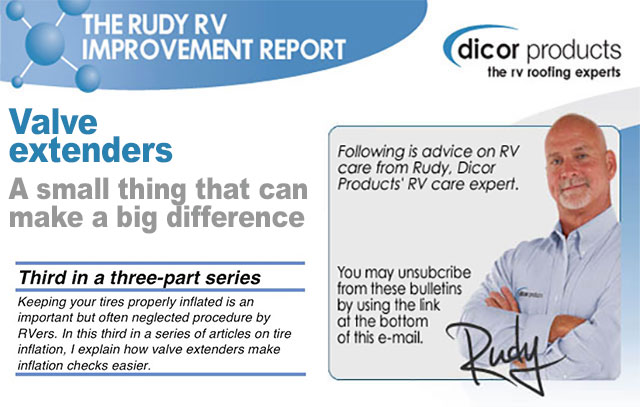|
I want to tell you about a small accessory that can make a big difference in creating a safer and more pleasant RV experience.
Maintaining proper tire inflation, as mentioned in a previous report, is a critical area of both safety and economics for the RVer. Both underinflated and overinflated tires can affect functions like handling and braking, making the motorhome more hazardous to drive. Most disturbingly, improper inflation could produce a sudden blowout that might cause a catastrophic accident. Excessively uneven treadwear and poorer gas mileage are some of the detrimental economic effects.
Then note tires will lose a air over time even without a puncture. Bridgestone-Firestone estimates a tire will lose 1 to 2 psi a month simply by diffusion through the sidewalls. And here's the big thing - Bridgestone-Firestone also estimates that 40 percent of RVers only check their pressure once every six months.
It's safe to say that most RVers don't keep tabs on their tire pressure anywhere close to the recommended checks by manufacturers, which could be as often as once a day when on a long driving trip.
 A big part of the problem is inaccessible valve stems that make checking tire pressure a chore. If your motorhome has wheel covers or simulators, the factory stems become very difficult to reach. And, as far as checking the pressure on the inside tire on dual wheels, forget that! A big part of the problem is inaccessible valve stems that make checking tire pressure a chore. If your motorhome has wheel covers or simulators, the factory stems become very difficult to reach. And, as far as checking the pressure on the inside tire on dual wheels, forget that!
Here's where a pack of valve stem extenders provide an easier way to check inflation, starting with the rear dual wheels. The up to eight-inch long valve extenders can loop from the inside tire out through the hand hole of the exterior wheel, allowing you to check pressure of both tires from the outside of the exterior wheels.
For front wheels with covers or simulators, a shorter, all-metal, angled valve extender enables the inflation valve to peek out from the hand holes for easy access. This makes checking tire pressure relatively quick and easy. So you are more likely to check your tires more often. The result: a safer RV experience, with less wear and tear on your tires and on you!
Side Note.
The valve extender "hoses" can be made out of different materials and have different burst strength ratings. We suggest using quality stainless steel braided, high pressure, hydraulic hoses. These have a slim profile and won't kink and form weak spots like rubber will. They are so flexible, in fact, that you can practically tie them in a knot. Whatever you choose at whatever the cost, it is a small price to pay for the convenience and peace of mind this kind of product can provide, which makes the whole RV experience just that much better.
NEXT: Wheel cover care
Come and follow Dicor on our new Facebook page! Just click on the Facebook icon!

|

